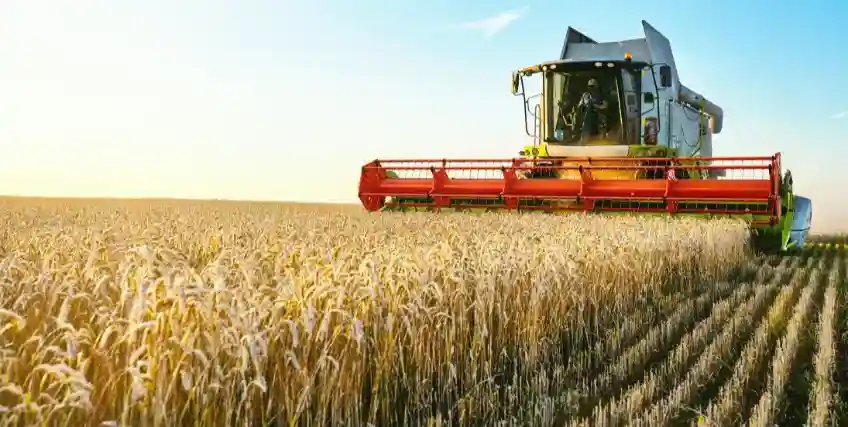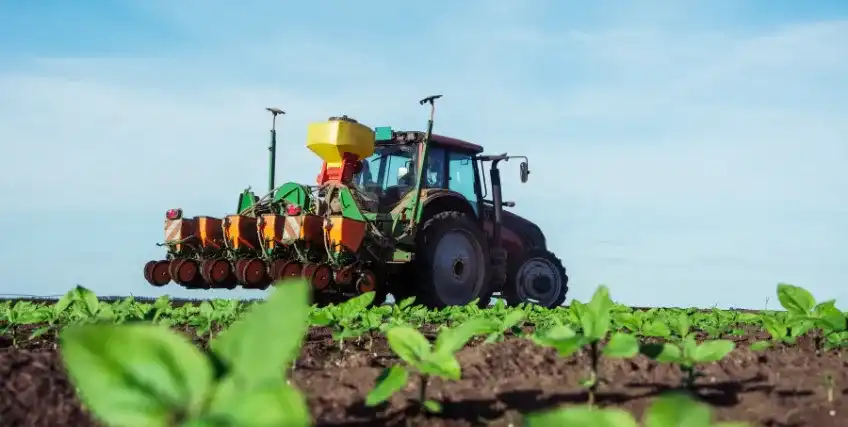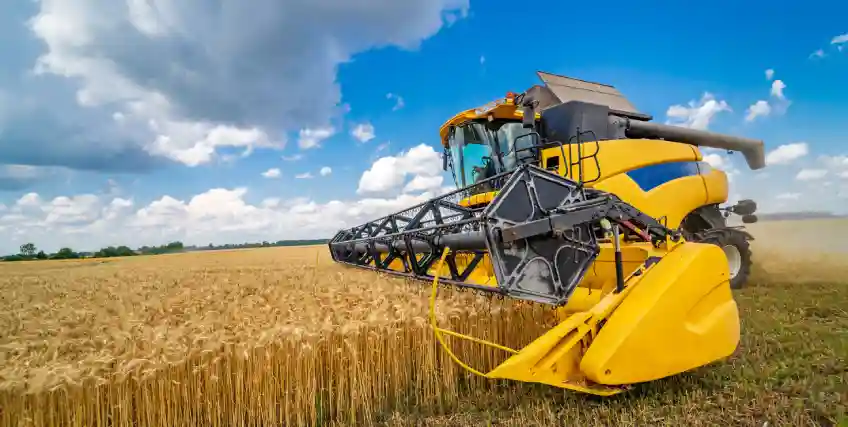The Farmer’s Guide to Agriculture Equipment Loans
Sep 16, 2025 | Last Updated on: Sep 17, 2025

Investing in modern equipment is essential for increasing farm productivity, but the high costs can be a challenge. Agriculture equipment loans spread the cost of purchasing new equipment over time with affordable monthly payments, even as farming equipment costs continue to rise. There are many different ways to finance the purchase of new equipment, so this guide explains the different loan options, shows farmers how to secure an agriculture equipment loan, and how to choose between financing, leasing, or using alternative loans. Plus, you'll learn how to improve your approval odds and how to choose the best lender for your agriculture equipment loan needs.
Understanding Agriculture Equipment Loans
Agriculture equipment loans are industry-specific loans that cater to the needs of farmers, from small, family-owned businesses to multi-national conglomerates. No matter the size of your business, using a loan to finance the purchase of equipment reduces the immediate impact on your cash flow while providing access to the equipment today. In short, you can purchase the equipment today to grow your business, paying off the loan over time with the increased revenue that the equipment generates.
Typical uses of agriculture equipment loans include:
- Farm tractor financing
- Combines
- Seeders
- Harvesters
- Irrigation systems
- Fencing
- Storage units
- Dairy equipment
- Livestock feeders
- Sprayers
- Utility vehicles
- Tillage equipment
- Greenhouse equipment
There are many different types of farm equipment loans, but the three main types are bank financing, leasing, and government-backed loans. Each of these loan types has its pros and cons and is best suited for different circumstances.
- Traditional bank financing: offers established farmers the chance to secure appealing loan terms based on their credit history and the farm's track record.
- Equipment leasing: is best when you want lower payments or the option to upgrade equipment every few years.
- Government-backed loans: offer guarantees that enable new businesses and farmers with less-than-perfect credit to get approved without paying exorbitant interest rates or loan fees.
Review the loan types below to learn more about them and choose the best agriculture equipment loan option for your farm.
Conventional Loan Options
Conventional loans are typically offered by traditional banks, credit unions, and online lenders. These loans provide straightforward financing for your agriculture equipment loan request.
Term Loans
A term loan is a loan that provides a lump sum of money upfront to purchase equipment. They loans have a fixed payment schedule and interest rate. You'll have the same monthly payment throughout the duration of the loan. When you've made the final payment, the loan is paid off, and any liens are released. In most cases, you can pay off the loan early without incurring a penalty.
These agriculture equipment loans often require good to excellent credit and a history of profitability, which can be challenging for startups and businesses with seasonal income. With a fixed monthly payment, you can budget more easily but there is no flexibility in the payment amount if you run into financial trouble.
Equipment Leases
An equipment lease is a loan tied directly to a specific piece of equipment. There are two main types of leases – $1 buyout (lease-to-own) and Fair Market Value (operating lease). Leases with a $1 buyout are effectively loans since the final payment is so small at the end of the lease term. However, unlike agriculture equipment loans, the borrower doesn't own the equipment until the buyout is made, so they can return the equipment if they don't want it.
Fair Market Value (FMV) leases typically have lower payments because of the residual value of the equipment. In other words, you're only making payments on a portion of the equipment's value. These leases are a wise choice if you're seeking a smaller monthly payment or want to upgrade or change equipment at the end of the lease term. However, if you plan to purchase the equipment at the end of the lease, your total finance costs could be significantly higher if you need to take out a loan for the residual value buyout.
Small Business Administration (SBA) Loans
The Small Business Administration (SBA) is not a lender that issues a disbursement to fund equipment purchases. Instead, it provides a guarantee to lenders, making them more willing to lend to borrowers who may not be able to get approved for traditional financing. This includes startups, applications for larger loan amounts, or borrowers who need more time to repay the loan.
There are three main types of SBA loans – SBA 7(a), SBA 504, and SBA Express microloans. Each of these types could be used as agriculture equipment loans, depending on the loan amount and how it is structured.
- SBA 7(a): The 7(a) loan program is the SBA's primary loan program for small business owners and family farmers. This loan type provides funding to acquire, refinance, or improve real estate or buildings, the purchase and installation of machinery and equipment, short- and long-term working capital, and more. It has a maximum loan amount of $5 million.
- SBA 504: SBA 504 loans provide long-term, fixed-rate financing for major fixed assets with a maximum loan amount of $5 million. These loans fund business expansion and job creation by providing financing for buildings, long-term machinery and equipment, consolidating qualified debt, and more. A big difference between the 504 and 7(a) is that 504 loan proceeds cannot be used for working capital or inventory.
- SBA Express: These loans provide lines of credit to small business owners for up to 10 years. No collateral is required for loans up to $50,000, but loan amounts can go up to $500,000 with collateral. The SBA guarantees just 50% of these loan amounts, so lenders may be more cautious when approving these applications.
The application process often takes longer than for a traditional loan. However, if you're willing to wait for the extra time, you may receive a lower interest rate on an agriculture equipment loan than a conventional bank or credit union offers.
FSA Farm Loans
The Farm Service Agency is part of the U.S. Department of Agriculture. These agriculture equipment loans help farmers, ranchers, and agri-business owners get the financing they need to start their business, buy new farm machinery and other equipment, and cover recurring expenses on the farm. The USDA also offers FSA Farm Loans to cover emergencies, fund non-traditional and specialty operations, or buy an existing farm.
Farmers can get FSA Farm Loans directly from the USDA or as a guaranteed loan from a USDA-approved lender. This process provides additional options for farms to get the money they need through agriculture equipment loans.
Business Lines of Credit
A business line of credit offers flexible repayment for seasonal needs. You only pay interest on the amount used, and your available credit increases as you pay down your balance. Interest rates on business lines of credit are variable, so your interest charges and monthly payment can change even when your balance doesn't. Your monthly payment is based on your outstanding balance and current interest rates. Unlike credit cards, there is no grace period, which means that interest accrues even if you pay off your charges in full each month. Some banks charge an annual fee, but they may waive it based on the usage of your line of credit.
Business lines of credit are ideal for short-term needs. You can use them for small equipment purchases, but they are not the best option for long-term financing like agriculture equipment loans are. Depending on your bank or the size of your line of credit, the bank may perform periodic reviews of your financials before it is renewed each year.
Alternative Financing Options
Personal Loans
Farmers who are just starting out or those with fluctuating business performance may turn to a personal loan instead of agriculture equipment loans. Personal loan approval is typically based on your personal income and credit score, rather than how profitable your business is. These loans tend to have smaller loan amounts and shorter repayment periods than conventional business loans. Using a personal loan for your business can also mix your personal and business finances, which can complicate your taxes.
Home Equity Loans
If you own a home, you may consider using a home equity loan or home equity line of credit (HELOC) to purchase equipment rather than an agriculture equipment loan. These home loans are secured by your home's equity, so they tend to offer lower interest rates than unsecured loans. However, if you are unable to make the payments, your home could be at risk.
Merchant Cash Advances
A merchant cash advance (MCA) provides quick access to funds based on customer credit card payments. These often carry high costs, and payments are taken out automatically as a percentage of your receipts. This can make it harder for business owners to manage their finances when payment amounts change regularly. MCA loan amounts may not be adequate for larger equipment purchases if you don't have enough revenue through this customer payment option.
Tips to Improve Approval Chances
Follow these tips for the best chances of getting approved for your agriculture equipment loan.
- Improve credit score before applying: Check your credit report for errors and take steps to boost your credit score by paying down your credit cards.
- Lower existing debt: Lowering your debt not only can boost your score, but it can lower your debt-to-income ratio. Paying off small balance loans can eliminate a monthly payment to help you qualify for the best terms.
- Build a strong relationship with local banks or credit unions: Local banks and credit unions often have more flexibility in approving loan applications. Having bank accounts, investments, and other loans with your local bank can improve your customer profile.
- Apply during strong revenue periods: Higher income makes it easier to get approved, so time your application if you have flexibility.
Comparing Lenders and Loan Terms
When comparing lenders, focus on the terms of each loan offer to ensure you're getting the best deal on your agriculture equipment loan.
- Banks vs. credit unions vs. online lenders: Compare quotes and loan options from a variety of lenders to find the loan amount and monthly payment that meet your needs.
- Interest rates, repayment terms, and hidden fees: Watch out for hidden fees by comparing annual percentage rates (APRs) rather than focusing on farm equipment interest rates. Determine if a higher rate is worth it to get a longer repayment period and lower monthly payment.
- The importance of prequalification: Prequalification typically doesn't impact your credit score. Getting prequalified can provide an estimate of your maximum loan amount and help you negotiate terms with your suppliers.
- Negotiating better terms: Always negotiate terms with lenders and who you're buying the equipment from. Lowering the purchase price or getting a lower rate can make your monthly payment more affordable.
The Bottom Line
Choosing the right loan type that matches your farm goals is the best way to keep interest charges down and ensure monthly payments are affordable. Compare lenders and negotiate prices with your lender and the equipment supplier to keep costs low. There are many different types of agriculture equipment loans, including conventional bank loans, leasing, and government-sponsored loans. If those are the right fit, then you can turn to alternative financing options like personal loans, home equity loans, or a merchant cash advance.
Frequently Asked Questions (FAQs) About Agriculture Equipment Loans
Can new farmers qualify for loans?
Agriculture equipment loans are available for both startups and experienced farmers. Beginning farmers may receive approval for smaller loan amounts and higher interest rates than their experienced counterparts until they establish a track record of profitability over several years. Compare interest rates, loan fees, and financing programs among lenders to find the best loan terms for your financing needs.
What’s the typical interest rate for agriculture equipment loans?
The typical interest rate for agriculture equipment loans varies based on your credit history, company financials, loan amount, repayment term, and loan type. Shorter loans and borrowers with excellent credit typically qualify for lower interest rates, while startups, those with longer loan terms, and those with poor credit usually receive higher rates.
How long does approval take?
Loan approval varies by lender, loan type, and loan amount. Many online lenders can provide quick approval and fund faster than a traditional bank. Traditional banks, leasing companies, and government-backed loans can take days or weeks due to their extensive underwriting processes.
Is leasing always cheaper than buying?
Leasing is typically cheaper than buying because of the residual value of the equipment. A $1 buyout lease is similar in cost to a loan due to its minimum buyout at the end of the term, while a Fair Market Value lease can provide substantial savings on monthly payments depending on the value assigned to the equipment. Over time, buying provides an overall lower purchase cost if you plan on keeping the equipment for the long term, since you don't own the equipment with a lease unless you execute the lease buyout at the end.
Can you buy farm equipment with a credit card?
Credit cards are a good option for everyday expenses on the farm, but it is an expensive way to finance long-term debt. For major purchases that you expect to pay off over time, an agriculture equipment loan or lease is the better choice. These loans allow you to buy the equipment today and start using it to make money while making monthly payments at a lower interest rate.
Frequent searches leading to this page
Term Loans are made by Itria Ventures LLC or Cross River Bank, Member FDIC. This is not a deposit product. California residents: Itria Ventures LLC is licensed by the Department of Financial Protection and Innovation. Loans are made or arranged pursuant to California Financing Law License # 60DBO-35839




